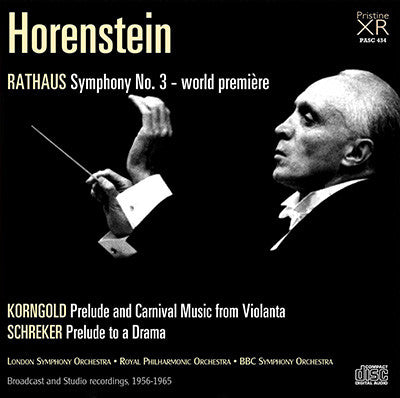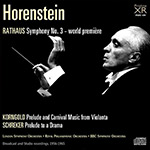
This album is included in the following sets:
This set contains the following albums:
- Producer's Note
- Full Track Listing
- Cover Art
- Musical Notes
Horenstein conducts friends and contemporaries: Rathaus, Korngold, Schreker
"This is rich, exotic, late Romantic lushness and it is given a sizzling performance by Horenstein"
- Fanfare
These three rare recordings offer a fascinating insight into Horenstein's musical friends and contemporaries: each composer, in his own way, was close to the conductor's heart. The main item, Rathaus's Symphony No. 3, was receiving its world première in an audience-free BBC studio, some 13 years after it was completed, and two years after the composer's death. The Schreker was another BBC recording, this time from a live concert at Maida Vale. Finally, the Korngold was recorded in stereo by Decca engineer Kenneth Wilkinson and produced by the composer's son, George Korngold, during spare time following a 1965 Reader's Digest session with the Royal Philharmonic.
There is considerable variation in sound quality: the 1965 stereo Korngold is by far the best, and we're grateful to the RPO for permission to release it here in light of considerable confusion over copyright ownership. The other two works were transcribed at some point from disc sources unknown; the Rathaus is the better of the two, with a wider tonal and dynamic range, while the top end is somewhat limited on the Schreker, though both have enormously improved by XR remastering over the thin and shrill source material with which I began.
Andrew RoseRoyal Philharmonic Orchestra
Kingsway Hall, London, 2 June 1965
Released with kind permission of the Royal Philharmonic Orchestra
London Symphony Orchestra
BBC Farringdon Studios, London, 13 March 1956
World première performance and recording
SCHREKER Prelude to a Drama (1913)
BBC Symphony Orchestra
BBC Maida Vale Studio 1, London, 16 November 1957
BBC Third Programme, 8pm broadcast
Jascha Horenstein, conductor
Musical Notes by Misha Horenstein
Karol Rathaus: Symphony no. 3 op. 50 (1942-43), London SO, 13 March 1956 (recorded at BBC Farringdon studios), world premiere performance and recording
Karol Rathaus was one of the most interesting composers of the exile generation. His musical language has its roots in the post-Romanticism of the early 20th century and in the early works of Schoenberg. During the 1920s, the period of his greatest successes, he was considered very radical and "inclined to atonality" but today his style can best be described as neo-Romantic, a fusion of the emotional surge of the nineteenth century with the vigor, motion and rhythmic vitality of the twentieth.
Despite his rich use of chromaticism and dissonance, Rathaus's musical world was essentially harmonic and tonal. His great skill as an orchestrator and his outstanding sense of rhythm endow his music with unusual vibrancy and vitality, in a manner that is scintillating, transparent, and idiomatic. He is also capable of evoking and sustaining a haunting, introspective lyricism that makes many of his slow movements memorable. It was his ability to fuse "tradition and evolution" that so impressed some of Berlin's most perceptive critics, who hailed him as "one of the strongest hopes of our new music."
After his move to America Rathaus's harmonic language became leaner, bolder, more acrid and dissonant, with an occasional digression into the grotesque and satirical as an escape from sentiment, elements that aptly characterize the mood of his Third Symphony.
Karol Rathaus was one of Horenstein's oldest and closest friends. A fellow student of Schreker's, they grew up and studied together in Vienna and then in Berlin, both their careers developed simultaneously and rapidly, both survived the Nazi period in exile in France and in America and both men saw a dramatic downturn in their fortunes after the war. But while Horenstein was eventually able to resurrect his career, Rathaus, whose music was so admired during the Weimar period, was excommunicated, cold-shouldered by the post-war realignment of musical priorities that cast him out of consideration and from where he has still not fully emerged. He died in 1954 at the age of only fifty-nine, a respected and honored professor of music at Queens College in New York but dispirited, disappointed and totally neglected as a composer.
Throughout his career Horenstein made enormous efforts to perform Rathaus's music and succeeded on a number of occasions, giving premieres of his works in France, Germany, Israel, Switzerland, Mexico and other Latin American countries as well as in Britain, where the present recording was made. As far as is known, this version of the Third Symphony, recorded in a BBC studio with no audience present, was the first performance of the work and Horenstein considered it a posthumous tribute to his recently departed friend. He conducted the symphony again before an audience in Berlin two years later, but whether that occasion constituted the work's first public performance is unknown.
Franz Schreker: Prelude to a Drama, BBCSO, 16 Nov. 1957 (Maida Vale Studio rec)
Contrary to what is generally assumed, Franz Schreker was not Horenstein's composition teacher at the Academy of Music in Vienna. He did study with him as a private student but only later joined his class after Schreker moved to the Hochschule in Berlin in 1920. Schreker was not enamoured of Horenstein's skills as a composer but very quickly recognized his true talent, procuring for him his first conducting job while still a student, in charge of two choirs directed until then by Hermann Scherchen. He also had a say in some of Horenstein's other appointments, but his influence and popularity as a composer took a dramatic plunge just as Horenstein's conducting career was beginning to take wing and although he made several attempts to perform his old professor's music during this period, none were successful before the arrival of the Nazis put a stop to everything. After the war there were several occasions when Horenstein programmed Schreker's music but it was not until 1952 and then 1957, the date of the present recording, that he was successful. Both events featured "Prelude to a Drama" and are the only known occasions that he conducted any music by Schreker.
Erich Wolfgang Korngold: Prelude and Carnival Music from Violanta, RPO, June 2, 1965 (at Kingsway Hall), London
Erich
Wolfgang Korngold and Horenstein, almost exact contemporaries, were
both raised and educated in Vienna before and during the First World
War. In April 1916 Korngold’s one-act tragic opera "Violanta" received
its local premiere at the Hofoperntheater conducted by Leopold
Reichwein. Recalling the event many years later Horenstein told an
interviewer that he and his Academy friends, probably jealous of
Korngold's wunderkind status, went to the premiere intending to boo and
make trouble but instead were so captivated by the opera that at the end
they carried Korngold through the streets on their shoulders like a
hero. This is the only known contact between Horenstein and Korngold
during the Weimar period, although they did meet socially after the war
in California. The "Prelude and Carnival Music" from "Violanta" was
recorded by Charles Gerhardt and produced by George Korngold, the
composer's son, for Reader's Digest Recordings. The recording was
unplanned, an afterthought following the early completion of
Rachmaninoff's "Isle of the Dead", and was never published on the
Reader's Digest label although it has appeared in various pirate
editions. It was only one of two occasions that Horenstein conducted
Korngold's music, the other being a concert performance in 1960 of the
incidental music to "Much Ado About Nothing" Opus 11 at the Royal
Festival Hall in London. In 1969 plans were made by the BBC for a
complete recording of "Violanta" that, much to his distress, had to be
shelved because of budgetary constraints.
Pristine's Review
This is a superb disc, and a continuation of the wonderful harvest of recordings becoming available
The major work here is the 40-minute symphony by Karol Rathaus, an important discovery. There is a more than adequate CPO stereo recording of the work conducted by Israel Yinon, but it lacks the drama and power of Horenstein’s reading, which happens to be the world premiere performance of the work, some 13 years after it was composed and two years after Rathaus’s death. Rathaus was Polish-born and Viennese-trained; in fact, he studied with Schreker, as did Horenstein. Active in Germany in the 1930s, Rathaus was smart enough to see what was coming and got out, going first to France, then to London, and finally to the U.S. He tried to catch on in Hollywood with other expatriates (Korngold, for instance) but did not make a name in film music. He was offered the position of professor of composition at Queens College in 1940, a job he held for most of the rest of his life (he died in 1954) and which gave him the financial security he had been missing. He thus was able to compose as he wished without worrying about financial remuneration. It was two years after he obtained that position that he wrote this work.
The Third Symphony is a work of considerable power and beauty, with a singularly moving first movement Andante. Throughout the style is late or post-Romantic, with echoes of Mahler and Strauss, and perhaps a touch of Berg, but also with a musical language that is his own. The prevailing tone of the work is dark, but not excessively grim. The third movement Andantino is marked by a touching tenderness and cumulative power, which Horenstein captures perfectly. This is a major mid-20th-century symphony, a work with a deeply personal and individual profile. It is also a work at the center of Horenstein’s strengths as a conductor, and because this was a BBC broadcast and recording, the quality of the original source is very high-level studio monaural from the middle 1950s. Andrew Rose’s XR stereo adds warmth and richness without blurring detail.
Korngold, who of course sprang from that same Viennese atmosphere that nourished Schreker, Rathaus, and Horenstein, wrote Violanta at the age of 17. And, by the way, it was his second opera! The quality of the music, particularly the skill in orchestration, is remarkable. This is rich, exotic, late Romantic lushness and it is given a sizzling performance by Horenstein. The recording was made during sessions Horenstein held for the Reader’s Digest, which released a number of Horenstein performances, but not this. Unlike the Rathaus and Schreker, this was originally a fine studio recording engineered by Decca’s Kenneth Wilkinson and produced by Korngold’s son George. To my knowledge this is its first release, and it is a wonderful addition to the Horenstein discography.
Curiously, Pristine Audio spells Schreker’s name with a second “c” before the “k” (Schrecker), a spelling I don’t find anywhere else. Prelude to a Drama does not appear to be intended for any specific dramatic work, but is rather a more generalized title. However, the work is an expansion (of significant proportion) of his Overture to the opera Die Gezeichneten (The Stigmatized), so we know this isn’t comedy. But there is little gloom in this 21-minute lush concert overture. Color and rhythmic drive are important ingredients, as is the ability to mold a long phrase. These, of course, are qualities that define Horenstein’s work. There are good other recordings by Gielen, Conlon, and Sinaisky, but Horenstein digs much more deeply into the late Romantic world of Schreker (which is not surprising since he studied with Schreker for a number of years, following him from Vienna to Berlin). The monaural BBC broadcast sound as remastered here is fine.
This is a superb disc, and a continuation of the wonderful harvest of recordings becoming available because of Andrew Rose’s relationship with Jascha Horenstein’s cousin Misha. We owe them both a debt of gratitude, as Horenstein was one of the most important (and most under-represented on records) conductors of the second half of the 20th century.
Henry Fogel
This article originally appeared in Issue 38:6 (July/Aug 2015) of Fanfare Magazine.

